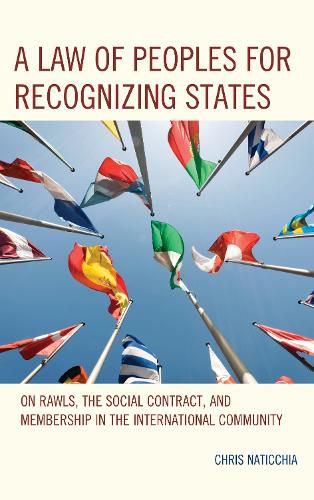Readings Newsletter
Become a Readings Member to make your shopping experience even easier.
Sign in or sign up for free!
You’re not far away from qualifying for FREE standard shipping within Australia
You’ve qualified for FREE standard shipping within Australia
The cart is loading…






Which political entities should the international community recognize as member states-granting them the rights and powers of statehood and entitling them to participate in formulating, adjudicating, and implementing international law? What criteria should it use, and are those criteria defensible? From Kosovo, Palestine, and Taiwan to South Sudan, Scotland, South Ossetia, Abkhazia, and Catalonia, these questions continuously arise and constantly challenge the international community for a consistent, principled stance.
In response to this challenge, Chris Naticchia offers a social contract argument for a theory of international recognition-a normative theory of the criteria that states and international bodies should use to recognize political entities as member states of the international community. Regardless of whether political entities adequately respect human rights or practice democracy, he argues, we must recognize a critical mass of them to get international institutions working. Then we should recognize secessionist entities that suffer from persistent, grave, and widespread human rights abuses by their government-and, under certain conditions, minority nations within multinational states that seek independence. We must also recognize entities whose recognition would contribute to the economic development of the least well-off entities.
Drawing on the social contract tradition, and developing a broadly Rawlsian view, A Law of Peoples for Recognizing States will both challenge and appeal to a broad readership in political philosophy, international law, and international relations.
$9.00 standard shipping within Australia
FREE standard shipping within Australia for orders over $100.00
Express & International shipping calculated at checkout
Which political entities should the international community recognize as member states-granting them the rights and powers of statehood and entitling them to participate in formulating, adjudicating, and implementing international law? What criteria should it use, and are those criteria defensible? From Kosovo, Palestine, and Taiwan to South Sudan, Scotland, South Ossetia, Abkhazia, and Catalonia, these questions continuously arise and constantly challenge the international community for a consistent, principled stance.
In response to this challenge, Chris Naticchia offers a social contract argument for a theory of international recognition-a normative theory of the criteria that states and international bodies should use to recognize political entities as member states of the international community. Regardless of whether political entities adequately respect human rights or practice democracy, he argues, we must recognize a critical mass of them to get international institutions working. Then we should recognize secessionist entities that suffer from persistent, grave, and widespread human rights abuses by their government-and, under certain conditions, minority nations within multinational states that seek independence. We must also recognize entities whose recognition would contribute to the economic development of the least well-off entities.
Drawing on the social contract tradition, and developing a broadly Rawlsian view, A Law of Peoples for Recognizing States will both challenge and appeal to a broad readership in political philosophy, international law, and international relations.